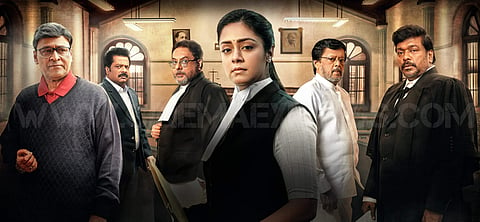

There is a Magistrate Court in Chennai where the judge is hidden behind a large pillar. Arguing advocates have to crane around the pillar to address him. Some enterprising soul has covered paint that’s peeling off with brown school notebook binding paper. On a broken wooden cupboard filled with case bundles, there is a colourful WordArt print-out that screams, “Happy New Year 2016.” Even today. But the place is always bustling. Lawyers flit in and out of the court hall, fidgeting constantly on their phones. Judges move from one case to the next in a tearing hurry, as the bench clerk barks out case numbers and adjournment dates, barely pausing between two cases. This duality of stillness and madness defines India’s courts. Only a handful of films have been able to capture it – Andavan Kattalai, Court, and some parts of Phir Milenge come to mind.
India, though, has another grand tradition of court films. Indo-Saracenic courtrooms with stained glass, the judges wielding a gavel, grunting “Order, order,” lawyers screaming “Objection, Yoraanar!”, the objections being “overruled” or “sustained,” the costumed dafedar shouting the name of the accused or a witness three times in the corridor looking vacantly into the distance while holding a sceptre, and the judge ending things with, “The court is adjourned.” Let me, as a lawyer, tell you some harsh truths – I’ve never seen a gavel, I’ve never heard “Order, order”, I’ve never screamed “Objection, Yoraanar!” These are either cinematic inventions or vestiges from the last time a screenwriter came to court. In this tradition of films, all rules of procedure are given a go-by. Witnesses appear out of nowhere, evidences are handed over across the bar with no forewarning, no lawyer ever relies on precedent or even argues an intricate point of law. Think Parasakthi, Jolly LLB, Mounam Sammadham, or Damini. In these films, the court is not a reflection of reality – it is a device to tell a story. The court as a temple of justice is perfect for morally murky tales, or to highlight an issue that society is still grappling with.
The recent Jyotika-starrer Ponmagal Vandhal wants to be the first kind of movie. It wants to be a real, gritty courtroom drama. Parthiban (if that is still his spelling these days), playing senior advocate Rajarathinam, tells off his junior for learning procedure from cinema and cites section 311 (of the Criminal Procedure Code, presumably, although he doesn’t specify) to him. But the rest of the film so inaccurate that it ends up being the regular, melodramatic Indian cinema court movie – and not even a very good one at that.
Real life courts hear dozens of cases each day. So, you’ll always see lawyers milling about courts, flitting in and out; not all seated neatly around the horseshoe. In Ponmagal Vandhal, almost all people in the court hall who aren’t lawyers are part of this case. Also, most cases in real courts get adjourned because either the witness is not present or the lawyer is not ready. We never see any of that in this movie. A big lawyer like Rajarathinam would definitely take a few adjournments in this kind of a trial because he is away in the High Court. We don’t even see him check his calendar when the judge sets the next date of hearing.
In real-life courts, witness examination is a mechanical affair. The advocate asks questions, the witness answers, and the stenographer records it. The judge oversees this process and is usually passive. The advocates don’t argue at this stage at all – they never draw conclusions when the witness is in the box. That is done after all the evidence is recorded, on a separate day set aside for final arguments. Often, by the time all the evidence is recorded and the matter is taken up for arguments, the judge would have changed! Ponmagal Vandhal settles into the regular cinematic format of recording evidence and appreciating evidence simultaneously. Most importantly (spoilers), if Venba (Jyotika) wanted her own eyewitness evidence to be taken on record, she would have had to stand in the witness box and be subject to cross examination. This is a huge violation of procedure.
The problem for court movies is that real courts are too boring, and cinematic courts are too unreal. The only film that straddled these two worlds with some amount of competence was Pink – it took liberties with procedure, but was real enough to be recognisable. There were sermons, but not during witness examination. The cross-examination scenes were gripping, but retained some semblance of reality.
There is nothing wrong with being a ‘court’ movie – it is a genre just like comedy or horror. It comes with its formulae, its strengths and clichés. Ponmagal Vandhal’s problem is that it is not a very good court movie. The writing just isn’t sharp enough for that.
The film, though, raises important issues and hands down good moral advice on how we, as a society, should view victims of sexual abuse. The police and judges in India still engage in victim-blaming, slut-shaming, and doubting evidence of victims. They are often corrupt and openly favour the powerful. That part of the story is absolutely accurate. Even though we’ve seen this in innumerable films, it doesn’t change the fact that this is exactly how our system works.
(The author is a practising lawyer and musician.)